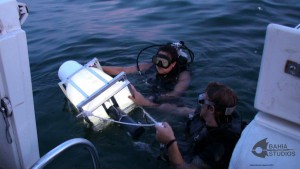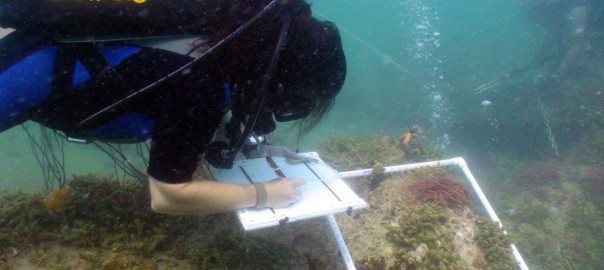In the spring of 2014, a small non-profit corporation made up of SPC faculty and former students started a research project funded by the Florida Game and Fish Commission. The study went for a year, and much of the information gained from this project will be presented by student researchers in a symposium on April 15 in the Fine Arts Auditorium on the Clearwater Campus at 7:30 p.m.
The study involved three artificial reefs and two natural reefs in the Gulf off of Pinellas County. Marine biology students from the Clearwater Campus traveled out to these five reefs once a month to collect samples of the larval fish with a “light trap” developed by Dr. Monica Lara. The goal was to determine what role these reefs play in larval recruitment of important fish species. The light traps were hung above the reefs overnight by divers trained in our SPC scuba classes. The following morning the traps were retrieved and the larval fish were preserved. Once back on campus, the students used microscopes to identify and count the tiny fish and invertebrates collected in these light traps.
A second part of this study was to make fish counts of the adult fish on each of the five reefs. These counts were made by having a pair of divers swim for fifty meters and count the fish on a two meter wide transect. These fish counts are a continuation of studies Reef Monitoring has been conducting since 2010. These counts give us baseline data to measure any future changes to the natural communities of our reefs.
A third part of the study was to collect sediment samples from adjacent to the reef and out away from the reef 100 meters in order to determine the impact of the reef on the populations of small marine organisms that make up much of the marine food chain. The sediment samples were preserved out in the boat and then returned to the campus for sorting by particle size and analysis of the invertebrate species collected.
This project not only gave our marine biology students invaluable experience in data collection in the field, but also experience in preparing the data for presentation before an audience of their peers. This type of hands on learning will be of great use once our students finish college and enter the work force.


